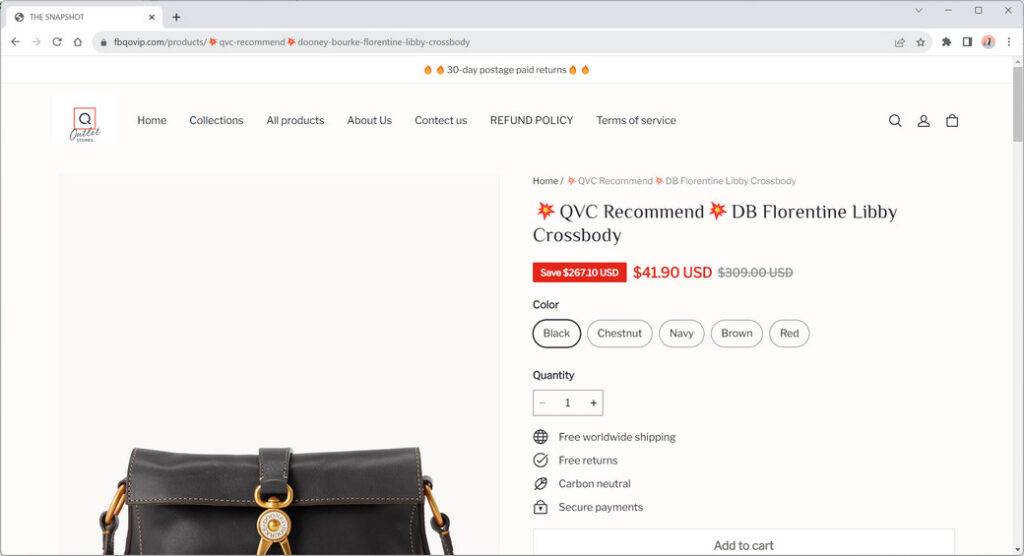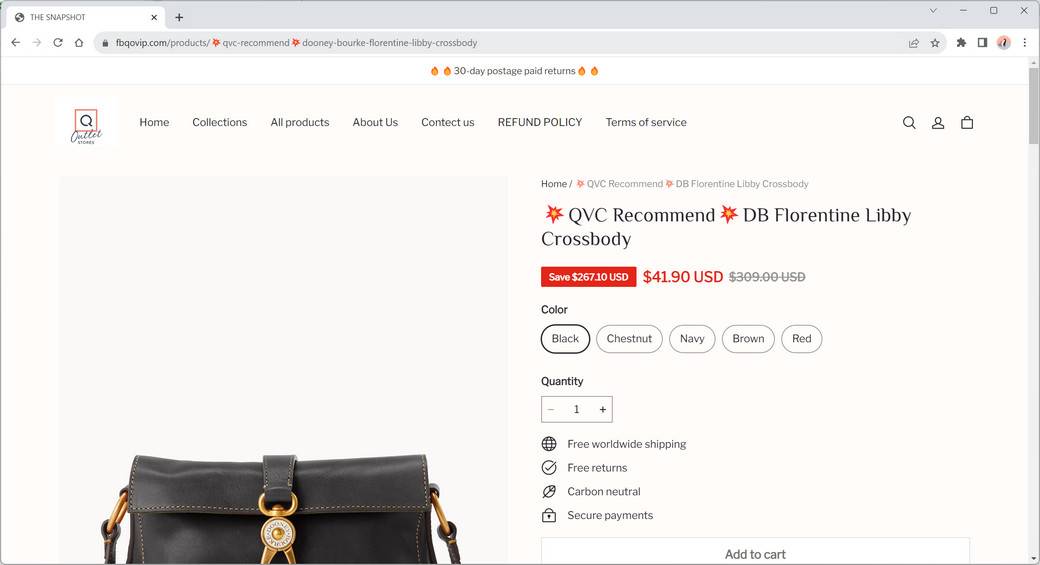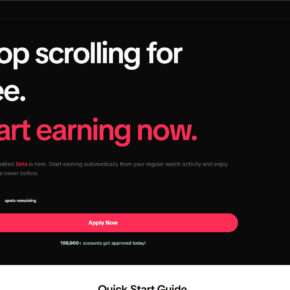A worrying new online shopping scam has emerged involving sophisticated fake websites that falsely claim to be associated with “QVC Outlet Stores” and promote convincing closing down sales with deep discounts. However, consumers should beware – “QVC Outlet Stores” websites are not real or authorized entities in any way. It is a completely fabricated name being illegally used by elaborate cybercrime groups to lure in victims and steal money and data.
This guide will uncover how this “QVC Outlet Stores” scam works, techniques to spot their fake websites, and most importantly, how to avoid being swindled by these e-commerce scammers exploiting the trusted QVC name. Keep reading to learn more about this fraudulent scheme and shop online safely.

Overview of the Fake “QVC Outlet Stores” Websites Scam
Online shopping scams involving highly sophisticated fake websites that falsely use the name “QVC Outlet Stores” are rapidly increasing. These fraudulent sites are deceiving customers by claiming this non-existent store is having massive “closing down” sales with unbelievable discounts up to 90% off.
To be absolutely clear, “QVC Outlet Stores” is not a real company. It is a completely fake name made up by scam website operators to try to falsely imply affiliation with the legitimate retailer QVC. Any site using this scam name is guaranteed to be fraudulent.
In-depth analysis indicates these elaborate fake sites are part of an extensive interconnected scam network based overseas. The operators are completely anonymous, lacking any transparency about who is behind these unauthorized counterfeit websites.
They display fake logos mimicking QVC, stolen QVC product imagery, and the false claim that “QVC Outlet Stores” is shutting down. However, the real QVC brand has no connection to this scam whatsoever.
These criminal sites bait customers with unrealistic prices on home goods, electronics, apparel and other products identical to those found on the real QVC site. All product images, descriptions, and content are stolen from QVC, demonstrating the lack of originality.
Once payments are submitted, customers either receive nothing or inferior knockoff items. The sophisticated scam network relies on social media ads to funnel traffic to their convincingly designed but completely fake websites.
This intricate scam aims to steal money through fraudulent orders, compromise users’ personal and payment data for potential identity theft, and avoid accountability through anonymity. Many scammed shoppers lose funds and have information stolen.
How the Fake “QVC Outlet Stores” Scam Unfolds
Here is how the scam typically plays out for victims:
Step 1: See Social Media Ads for the Fake Store’s “Closing Down Sale”
The scam starts with enticing ads on Facebook, Instagram, or TikTok with messages like “QVC Outlet Stores Closing Down Sale! Up to 90% off everything!” Links go to counterfeit sites using the fake QVC Outlet Stores name.
Step 2: Visit Fake QVC Website
The website falsely claims “QVC Outlet Stores” is “closing down” and mimics QVC branding and site design. Prices are suspiciously low to further the deception. All content is stolen from legitimate sources.
Step 3: Submit Order and Personal Information
During checkout, users enter shipping address, email, payment info, and other personal data which exposes them to potential identity theft down the line.
Step 4: Bait and Switch Tactics
Once orders are placed and paid for, customers receive:
- Nothing at all, just stolen money.
- Cheap counterfeits rather than advertised products.
- Used or tampered with items instead of new.
- Emails and calls go unreturned as the criminals have already captured the payments.
Step 5: Chargebacks Fail Through Banks
Banks often cannot identify the phantom merchant, so fraudulent chargeback attempts fail. Users lose money and some have personal information stolen.
Safely Shopping at the Real QVC Online
To avoid this scam, always make sure to only shop directly at the real QVC website QVC.com. Never trust any site using the fake name “QVC Outlet Stores” or promoting unbelievable closing down deals. No matter how convincing the website looks, it is fraudulent if using that scam name. Stick with the real QVC site for safe shopping.
Steps if Scammed by a Fake “QVC Outlet Stores” Website
If you ordered from an unauthorized fake site using the QVC Outlet Stores name and either got nothing or knockoffs, take these steps right away:
- Contact your bank immediately – Alert them to disputed charges and consider canceling your card to prevent further fraud.
- Keep records – Save receipts, emails, screenshots, and transaction details as proof of the scam.
- File a complaint – Report the fraud to the FTC and Internet Crime Complaint Center. Provide records.
- Leave online reviews – Post details of the scam on consumer review sites to warn others, but don’t defame legitimate businesses.
- Report social media accounts – If it involved social media, report the accounts to get them removed.
- Reverse payments – If you paid with a credit card, request a chargeback. For wire transfers, contact the recipient bank.
- Check credit reports – Request reports to check for any accounts opened fraudulently using your information. Consider placing a credit freeze if needed.
- Reset account passwords – Change passwords on any online accounts that used the same login credentials entered on the scam site.
- Check your device for viruses – Run a malware scan to check for any viruses that may have infected your device through the site.
- Learn from the situation – Study how you were deceived so you can avoid other scams in the future.
Being vigilant against shopping scams and acting quickly when scammed can help limit financial and identity theft impact. Reporting it helps authorities investigate and shutdown active scam sites.
Fake “QVC Outlet Stores” FAQs
Is “QVC Outlet Stores” a real store?
No, “QVC Outlet Stores” is a 100% fake scam name. It is not authorized, endorsed, or associated in any way with the real retailer QVC. Any site using that name is guaranteed to be fraudulent.
Can the deals be real if a site says it’s QVC Outlet Stores?
Absolutely not. Since it is a fabricated name, any claims of closing down sales or deep discounts by sites using that fake name are completely false. Real QVC does not offer 90% off deals.
How can I identify a fake QVC Outlet Stores site?
Warning signs include the use of that scam name, grammar/spelling errors, unbelievable pricing, stock photos, lack of legitimate contact details, and temporary-looking website URLs. None of these would be seen on real QVC sites.
Is it safe to buy from QVC Outlet Stores on Instagram or Facebook?
No, any social media offers claiming affiliation with the fake and non-existent QVC Outlet Stores name should be considered highly suspicious and unsafe. Only trust real QVC websites.
Can I get a refund if I was scammed by a fake QVC Outlet Stores site?
If you unfortunately placed an order, immediately contact your bank/credit card company to report fraudulent charges and request a chargeback, providing details and evidence of the scam. If you wired funds, recovery is extremely difficult.
The Bottom Line
Any website claiming to be or associated with “QVC Outlet Stores” is 100% fraudulent. The QVC name is being illegally used to trick shoppers seeking bargains. Consumers must stick to the real QVC.com site and avoid the unbelievable deals these scams promote. With knowledge of their tactics, savvy shoppers can steer clear of these sophisticated fake websites aiming to steal money and data using a fake QVC affiliation as a front.





![Remove TitanChainEdge.com Pop-ups [Virus Removal Guide] 10 McAfee scam 4](https://malwaretips.com/blogs/wp-content/uploads/2023/08/McAfee-scam-4-290x290.jpg)